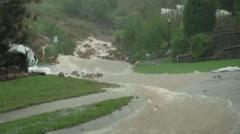The Valencia region faces devastation as local authorities failed to issue timely flood warnings, leading to catastrophic consequences in towns downstream from where the flooding originated.
Unanticipated Floods in Valencia: An Alarm System Failure

Unanticipated Floods in Valencia: An Alarm System Failure
Torrential rains lead to catastrophic flooding in eastern Spain, raising concerns over lack of timely warnings for affected areas.
In the wake of catastrophic flooding that struck Valencia, eastern Spain, the local authorities are under scrutiny following a tragic delay in alerting residents of towns downstream. This natural disaster, beginning with heavy rains on October 29, caught many off guard, resulting in over 200 fatalities and extensive damage across the region.
The destruction took root in Utiel, a winemaking town situated inland, where rainfall began early in the day. By noon, the streets were already submerged, and within hours, the Magro River overflowed its banks, inundating homes and dragging cars along with the rushing water. Mayor Ricardo Gabaldón noted that while local emergency responders were alerted, there was no communication sent to towns situated further downstream, such as Algemesí, which faced the brunt of the flooding in the evening.
Many local mayors expressed their frustration over the communication breakdown, as towns like Algemesí were left defenseless, waiting for warnings that never came. Mayor José Javier Sanchis Bretones lamented, “I don’t know why they didn’t warn us,” highlighting a critical systemic failure at the regional authorities.
As the search efforts continue, residents from the affected areas have raised concerns not just over the immediate lack of warning but also over the broader implications for disaster preparedness in the region as the climate crisis intensifies. The grim events of October serve as a sobering reminder of the potential human cost when emergency protocols fail, prompting calls for a reevaluation of existing emergency response systems to prevent future tragedies.
The destruction took root in Utiel, a winemaking town situated inland, where rainfall began early in the day. By noon, the streets were already submerged, and within hours, the Magro River overflowed its banks, inundating homes and dragging cars along with the rushing water. Mayor Ricardo Gabaldón noted that while local emergency responders were alerted, there was no communication sent to towns situated further downstream, such as Algemesí, which faced the brunt of the flooding in the evening.
Many local mayors expressed their frustration over the communication breakdown, as towns like Algemesí were left defenseless, waiting for warnings that never came. Mayor José Javier Sanchis Bretones lamented, “I don’t know why they didn’t warn us,” highlighting a critical systemic failure at the regional authorities.
As the search efforts continue, residents from the affected areas have raised concerns not just over the immediate lack of warning but also over the broader implications for disaster preparedness in the region as the climate crisis intensifies. The grim events of October serve as a sobering reminder of the potential human cost when emergency protocols fail, prompting calls for a reevaluation of existing emergency response systems to prevent future tragedies.























